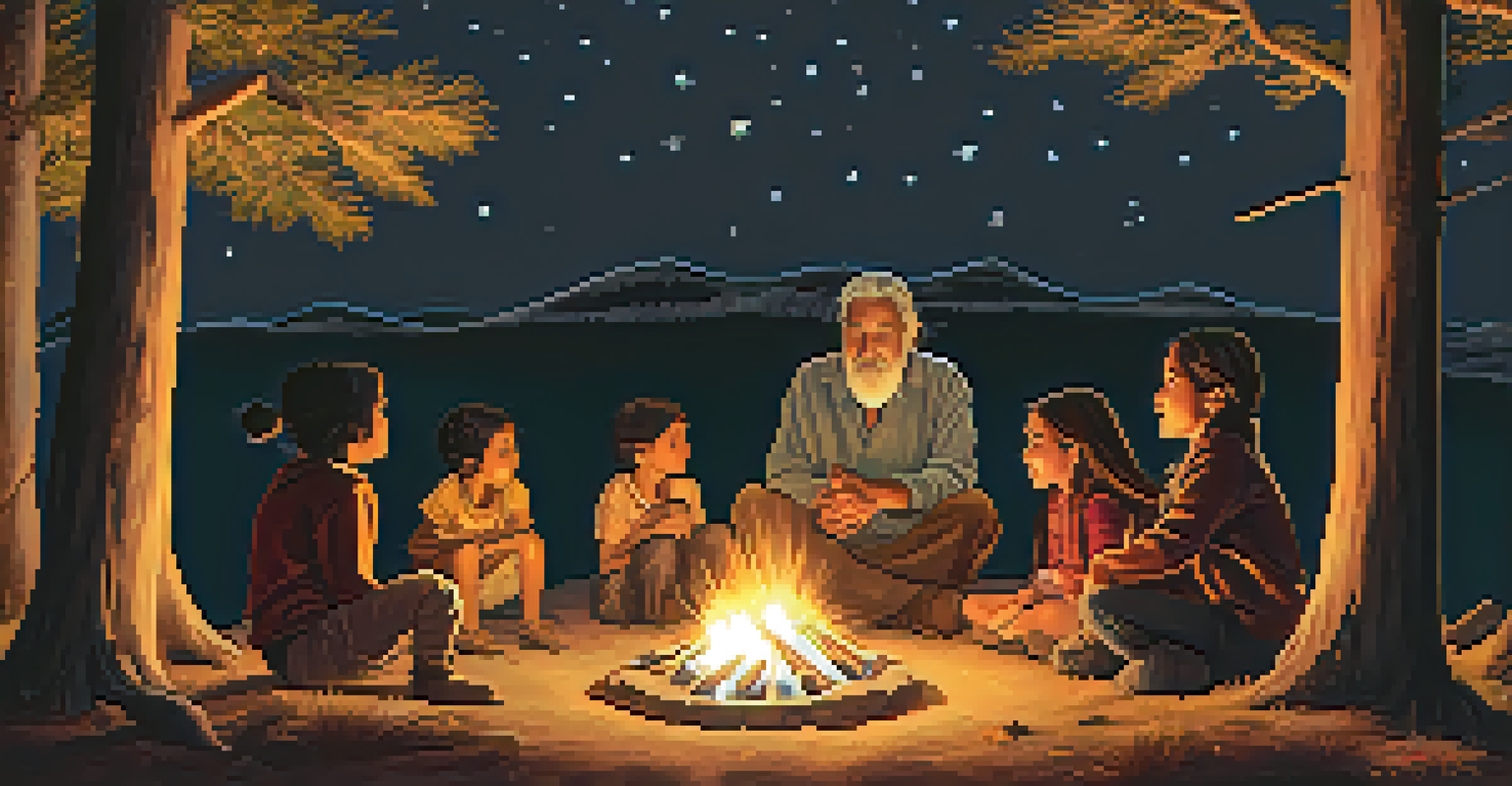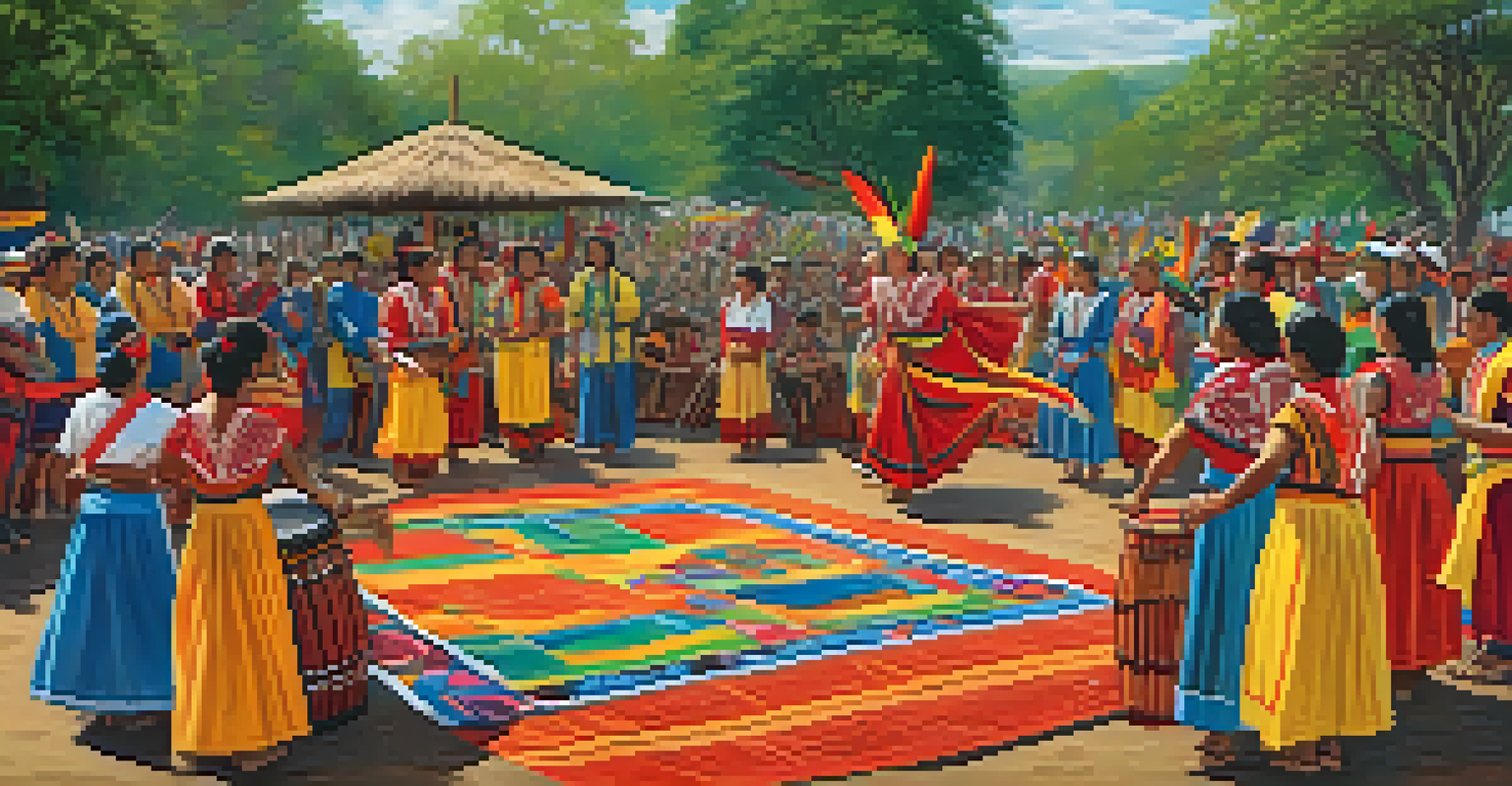The Concept of Time in Indigenous Spiritual Beliefs

Understanding Indigenous Views on Time
Indigenous cultures often have a unique understanding of time, which differs significantly from Western linear concepts. For many Indigenous peoples, time is cyclical, reflecting the rhythms of nature and the seasons. This perspective emphasizes continuity, where past, present, and future coexist, creating a rich tapestry of experiences.
Time is a created thing. To say 'I don't have time,' is like saying, 'I don't want to.'
In these cultures, historical events are not just memories but are seen as living legacies that influence the present. For instance, many Indigenous stories and teachings incorporate ancestral wisdom that guides current practices and decisions. This interconnectedness allows individuals to draw strength and guidance from their heritage.
Moreover, the cyclical view of time fosters a deep respect for nature, as each season brings its own lessons and opportunities. Celebrations, rituals, and ceremonies align with natural cycles, highlighting the importance of harmony with the environment. Thus, time becomes a companion in the journey of life, rather than a strict schedule to adhere to.
The Role of Nature in Indigenous Timekeeping
Nature plays a vital role in how Indigenous cultures perceive and measure time. Many Indigenous groups rely on natural indicators, such as the position of the sun, lunar phases, and seasonal changes, to guide their daily activities and spiritual practices. This reliance fosters a profound connection to the land and its cycles.

For example, some Indigenous communities mark the changing of seasons with specific ceremonies that honor these transitions. These rituals not only celebrate nature's gifts but also reinforce the community's bond with the environment. By synchronizing activities with the natural world, they ensure sustainable living.
Cyclical Time and Nature's Rhythms
Indigenous perspectives view time as cyclical, reflecting the interconnectedness of past, present, and future, and emphasizing harmony with nature.
Additionally, this relationship with nature helps Indigenous peoples to maintain a holistic view of time, where every moment is seen as an opportunity to learn and grow. By respecting the natural world, they cultivate a sense of responsibility toward future generations, ensuring that the wisdom of the past is passed down.
Stories and Oral Traditions: Timekeepers of Culture
Oral traditions are fundamental in Indigenous cultures, serving as the primary means to pass down knowledge and wisdom across generations. These stories often encapsulate lessons about time, history, and the interconnectedness of life. Through storytelling, time is woven into the fabric of cultural identity.
The past is never dead. It's not even past.
Elders play a crucial role in this process, acting as custodians of knowledge who share stories that reflect the community's values and beliefs. These narratives often highlight significant events and figures from the past, demonstrating how history informs the present and shapes the future. This practice ensures that cultural heritage remains vibrant and relevant.
Furthermore, the act of storytelling itself is a communal experience that reinforces relationships and collective memory. By gathering together to share these tales, Indigenous peoples create a living timeline that honors their ancestors while inspiring future generations to carry these teachings forward.
Rituals and Ceremonies: Marking the Passage of Time
Rituals and ceremonies are essential expressions of Indigenous spirituality, often tied closely to their understanding of time. These events not only commemorate significant occasions but also serve to reinforce the community's connection to ancestral teachings and the natural world. Each ritual is steeped in meaning and reflects the community's beliefs about time and existence.
For example, seasonal ceremonies might celebrate the arrival of spring or the harvest, marking the cyclical nature of life. These gatherings involve songs, dances, and offerings that honor the spirits and express gratitude for the gifts of nature. Through these practices, time is experienced as a sacred continuum rather than a mere chronological measurement.
The Power of Oral Traditions
Oral storytelling in Indigenous cultures serves as a vital means of passing down knowledge and cultural identity across generations.
Moreover, rituals often include elements that connect participants to their past, present, and future, emphasizing the importance of continuity. This practice fosters a collective identity and reminds individuals that they are part of a larger story that transcends time. In this way, rituals become a powerful tool for reaffirming cultural values and teachings.
Dreams and Visions: A Spiritual Dimension of Time
In many Indigenous cultures, dreams and visions are considered significant portals to understanding time and guidance from the spirit world. These experiences are often viewed as messages from ancestors or the divine, providing insights into one's life journey. As such, they are taken seriously and can influence decisions and actions.
Dreams may reveal past events, offer warnings about future challenges, or provide clarity on current dilemmas. Individuals might engage in practices like dream journaling or sharing within the community to interpret these experiences. This reflects the belief that time is not solely linear but can also be fluid and interconnected with spiritual dimensions.
Additionally, the interpretation of dreams can strengthen one's connection to their cultural identity and heritage, reinforcing the idea that one's life is part of a greater narrative. This spiritual understanding of time encourages individuals to be mindful of their actions and their impact on the community and the world.
The Impact of Colonization on Indigenous Concepts of Time
Colonization has had a profound impact on Indigenous beliefs, including their understanding of time. The introduction of Western notions of time—such as rigid schedules and linear progression—often disrupted traditional practices and ways of life. Many Indigenous communities faced challenges in maintaining their cultural identities amidst these changes.
As Indigenous peoples navigated the complexities of colonization, they often found themselves adapting their practices to survive. This adaptation sometimes led to the blending of Indigenous and Western beliefs, creating new forms of understanding time that honor both traditions. However, this process has not been without its struggles and conflicts.
Colonization's Impact on Time Perception
Colonization has disrupted traditional Indigenous understandings of time, leading to adaptations that blend Indigenous and Western concepts.
Despite these challenges, many Indigenous communities are actively reclaiming their cultural practices and revitalizing their traditional understandings of time. This resurgence reflects a resilience and dedication to preserving their heritage while also charting a path forward in a rapidly changing world.
Reconnecting with Indigenous Perspectives on Time
In today's fast-paced world, there is a growing recognition of the value of Indigenous perspectives on time. As people seek more meaningful ways to live and connect with nature, many are turning to Indigenous teachings to find balance and harmony. This shift highlights the importance of understanding time as a relational and experiential concept.
Engaging with Indigenous communities can provide opportunities to learn about their unique philosophies and practices. Workshops, cultural exchanges, and storytelling sessions can offer insights into how these cultures perceive time, encouraging a deeper appreciation for the rhythms of life. This, in turn, can inspire individuals to incorporate these teachings into their own lives.

Ultimately, reconnecting with Indigenous perspectives on time invites us to reflect on our relationship with the world around us. By embracing a more holistic understanding of time, we can cultivate a greater sense of presence, gratitude, and interconnectedness in our lives.